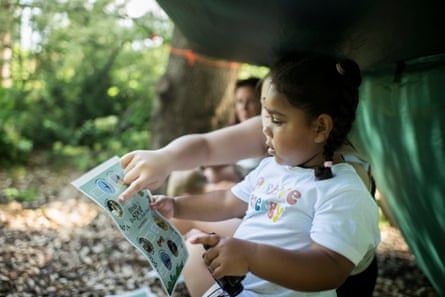Is There a Park That Allows Duck Feeding
London's royal parks are urging visitors to stop feeding bread to ducks because it is causing overcrowding and bullying among birds, the Guardian can reveal.
A campaign launching today highlights how excessive feeding upsets fragile ecosystems, leading to large groups of aggressive gulls and crows that steal the eggs and chicks of other birds. Leftover food also attracts rats, and soggy bread and waterfowl faeces contaminate the water.
The message is part of a new Help Nature Thrive campaign, which involves putting 250 signs around the parks to encourage visitors to stop giving wildlife food of any kind – even if it is what they naturally eat – because of unintended harmful impacts. The royal parks are among the busiest in the country, with 77 million visitors each year, and numbers increasing during the pandemic.
"It's such a difficult thing to address because it's part of a tradition for many of us, going out and feeding the birds with your kids," said Peter Lawrence, a biodiversity manager at the royal parks. "People feed birds from a good place, but there are unintended consequences."
Lakes and ponds can only sustain a certain number of waterfowl. More food means larger populations, but without extra space the birds get stressed and the risk of disease spreading increases. Swan numbers have ballooned, with 175 across Hyde Park and Kensington Gardens today compared with just 13 in 1990. Only three to four pairs can breed on a waterbody of the size contained in the two parks, which means a few dominant males end up bullying an entire flock, the park authorities said.
During a two-hour period on a small stretch of the Serpentine lake in Hyde Park last month, birds were fed 15 times, and that was at a relatively quiet time of day, said Lawrence. The population of crows around the lake has increased tenfold since 2004.
"It's just a case of the sheer numbers of people and the sheer quantity of food that is being fed to the waterfowl. It's kind of unprecedented and it really does have a whole suite of impacts," he said.

Waterfowl faeces may also harbour zoonotic diseases, while water birds trampling on the grass causes bare, muddy ground which takes a long time to recover. Feeding also stops wildlife behaving in natural ways, with birds such as herons now begging for food from humans instead of hunting around the edge of ponds.
"In the past it would have been acceptable to collect eggs and butterflies and now we're asking people to change their behaviour again," said Lawrence. Signs are being erected around the eight royal parks asking people to keep their distance and urging visitors to observe wildlife in its natural habitat.
"Wildlife doesn't need handouts," the campaign tells visitors, as there is already an abundance of natural food, including aquatic plants, grasses and insects.
As part of the campaign, authorities are reminding visitors that it is illegal to feed deer. Visitors are encouraged to stay at least 50 metres away from them. Plastic litter from food wrappings can block their digestive systems and there have been cases of animals starving to death as a result.
Instead of giving food, park conservationists are urging visitors to become bird-spotting detectives or go on wildlife trails. As part of the campaign, there will be photography competitions run on the parks' social media pages and other online resources.
Park authorities are planting trees and creating wildflower meadows, reedbeds, and new ponds for invertebrates and amphibians as part of a 10-year Biodiversity Framework. This will provide additional food for birds, giving them a natural and balanced diet that will keep them healthier, conservationists say.

There are 400,000 records of more than 6,000 species in the royal parks, including 4,700 species of invertebrates. "This is about education not enforcement, we just want to present the information, and we're hoping that people – when armed with all the information – will decide to do one of our other activities instead," said Lawrence.
Conservationists are split about whether to feed waterbirds. The Royal Society for the Protection of Birds (RSPB) encourages people to feed birds because it helps people connect with the wildlife around them, but warns that too much bread can leave them feeling full without giving them all of the important vitamins, minerals and nutrients they need.
An RSPB spokesperson said: "So, although bread isn't harmful our advice is to only feed small amounts to birds. As an alternative, we encourage people to use things like sweetcorn, porridge oats, crumbled biscuits and defrosted frozen peas as well as bird seed."
Find more age of extinction coverage here, and follow biodiversity reporters Phoebe Weston and Patrick Greenfield on Twitter for all the latest news and features
Source: https://www.theguardian.com/environment/2021/jun/10/dont-feed-the-ducks-royal-parks-warn-bullying-birds-lockdown-london-aoe
0 Response to "Is There a Park That Allows Duck Feeding"
Post a Comment